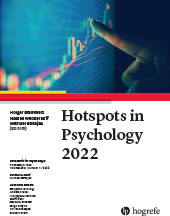Call for Papers: “COVID-19 and Coping With Future Crises: Perspectives of Educational and Developmental Psychology”
A Topical Issue of the Zeitschrift für Psychologie
Focus of the Topical Issue, Aims, and Scope
COVID-19 has challenged societies and our educational systems in particular, with dramatic cuts into established practices and imposing challenging new requirements. As a consequence, vast differences emerged in how individual students, teachers, and parents, different schools, and different educational systems managed to cope with this unprecedented crisis. Through understanding these differences, we can learn from this health and economic crisis and support educational policies in steering and mitigating such crises in the future. In this call for papers for the Zeitschrift für Psychologie, we invite contributions that use the lens of educational and developmental psychology to derive what we have can learned from this pandemic. From a macro, meso, and micro perspective, we aim at improving future pandemic preparedness by tackling three key questions: (1) How can educational systems be prepared for future health and associated economic crises to mitigate impacts of learning and development as well as psycho-social functioning of students? (2) Which competencies need to be fostered in students or teachers and how can this be achieved? (3) How can social inequalities be alleviated and an increase in educational gaps during crises be counteracted? We seek original research contributions that use survey or experimental data, social media data or objective data, or combinations thereof. The main focus will be on presenting original data to derive and justify implications and recommendations.
How to Submit
There is a two-stage submissions process. Initially, interested authors are requested to submit extended abstracts of their proposed papers. Authors of the selected abstracts will then be invited to submit full papers. All papers will undergo blind peer review.
Stage 1: Structured Abstract Submission
Authors interested in this special issue must submit a structured abstract of the planned manuscript before submitting a full paper. The goal is to provide authors with prompt feedback regarding the suitability and relevance of the planned manuscript to the special issue.
The deadline for submitting structured abstracts is June 15, 2022
Feedback on whether or not the editors encourage authors to submit a full paper will be given by July 15, 2022.
Submission Guidelines for Structured Abstracts
Structured abstracts should be no more than 1,500 words and may encompass information on each of the following headings: (a) Background, (b) Objectives, Research question(s) and/or hypothesis/es, (c) Method/Approach, (d) Results/Findings, (e) Conclusions and implications (expected).
Structured abstracts should be submitted via email to Marko Lüftenegger (marko.
Stage 2: Full Paper Submission
For those who have been encouraged to submit a full paper,
the deadline for submission of manuscripts is October 15, 2022
The full papers must be submitted through the online submission system of the journal, Editorial Manager. Full manuscripts will undergo a blind peer-review process.
Submission Guidelines for Full Papers
- •Only English-language submissions can be considered.
- •Contributions must be original (not published previously or currently under review for publication elsewhere).
- •Original research articles should not exceed 45,000 characters and spaces in length, including references, figures, and tables (allowances for figures and tables should be deducted on the basis of size: approximately 1,250 characters for a quarter-page figure/table).
- •Other submission formats (short reports, research summaries, opinion pieces, etc.) are also considered, please contact the editors for details.
- •Reference citations in the text and in the reference list should be in accordance with the principles set out in the Publication Manual of the American Psychological Association (7th ed.).
- •Supplementary material must be made available through digital open access repositories such as PsychArchives: https://www.psycharchives.org/
- •See also any recent issue of the journal.
For detailed author guidelines, please see the journal’s website at www.hogrefe.com/j/zfp/
For additional information, please contact: marko.
Timeline
- •June 15, 2022: Abstract submissions due
- •July 15, 2022: Feedback to authors
- •October 15, 2022: Full paper submissions due
- •December 15, 2023: Feedback to authors of full paper submissions due
- •February 15, 2023: Revised manuscripts due
- •February 28, 2023: Editorial decision about acceptance/refusal of revised papers due
- •Issue 3 (2023): Publication of topical issue
About the Journal
The Zeitschrift für Psychologie, founded in 1890, is the oldest psychology journal in Europe and the second oldest in the world. One of the founding editors was Hermann Ebbinghaus. Since 2007 it is published in English and devoted to publishing topical issues that provide state-of-the-art reviews of current research in psychology. For more detailed information about the journal please visit the official website at http://www.hgf.io/zfp.



